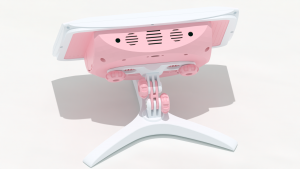Difference between revisions of "CLIO Facilitator Guide"
| Line 21: | Line 21: | ||
====Exhibit==== | ====Exhibit==== | ||
<gallery> | <gallery> | ||
File:CLIO Exhibit menu.png|alt= | File:CLIO Exhibit menu.png|alt=CLIO Exhibit menu | ||
</gallery>Here, you can view the currently selected Activities. Resume the previously loaded activities, choose from preset collections of activities, or select entirely new ones. After selecting your activities, you can enter ‘Exhibit Mode’. | </gallery>Here, you can view the currently selected Activities. Resume the previously loaded activities, choose from preset collections of activities, or select entirely new ones. After selecting your activities, you can enter ‘Exhibit Mode’. | ||
====Facilitation==== | ====Facilitation==== | ||
<gallery> | <gallery> | ||
File:CLIO Facilitation Menu.png|alt= | File:CLIO Facilitation Menu.png|alt=CLIO Facilitator menu | ||
File:CLIO Facilitator Discussions.png|alt= | File:CLIO Facilitator Discussions.png|alt=CLIO Facilitator Discussions | ||
File:CLIO Discussion menu.png|alt= | File:CLIO Discussion menu.png|alt=CLIO Discussion Menu | ||
</gallery> | </gallery>This menu provides facilitators with program information, such as goals, objectives, and facilitation instructions. Discussions can provide quick reference information about questions related to the program. | ||
====Activities==== | ====Activities==== | ||
<gallery> | <gallery> | ||
File:CLIO Activity menu.png|alt= | File:CLIO Activity menu.png|alt=CLIO Activity menu | ||
</gallery> | </gallery>Facilitators can preview Activities by tapping on them, and then select them for ‘Exhibit Mode’ by tapping the + icon. Activities can be sorted by activity type and intended audience. | ||
====Settings==== | ====Settings==== | ||
Change the display brightness, customize the theme, choose which program is loaded and troubleshoot common problems. | <gallery> | ||
File:CLIO Settings menu.png|alt=CLIO Settings menu | |||
</gallery>Change the display brightness, customize the theme, choose which program is loaded and troubleshoot common problems. | |||
====Accessibility==== | ====Accessibility==== | ||
Enable contrast modes and change text settings to improve readability. | Enable contrast modes and change text settings to improve readability. | ||
Revision as of 14:10, 15 March 2023
Overview
Facilitators set up CLIO kiosks and get them working as part of an exhibit.
Printable Brochure
We provide a single-page, double-sided Getting Started Facilitator Guide brochure. This guide can be printed on a cardstock and folded in half to be stored with the kiosks to assist new facilitators with setup.
Using a CLIO Exhibit Kiosk
Setting up the POP Kiosk
During storage, any mounting accessories were probably removed and the thumbscrews used to mount them were attached back to the case. First, we need to remove these thumbscrews so we can re-attach the mounting accessories. Next, orient the kiosk face down on a flat surface with the USB-C power port facing away from you. Attach the mount accessory to the bolt holes on the back or sides of the case. The mounting accessory's thumbscrews can tightened and loosened to adjust the viewing angle.
The POP Kiosk requires a 5.1V 3A power supply with a high-quality cable and USB-C adapter to perform optimally. Once plugged in, the kiosk will turn on and enter into ‘Facilitator Mode’ automatically. This interface allows facilitators to select their desired activities and change kiosk settings before entering ‘Exhibit Mode’.
'Facilitator Mode' allows facilitators to configure the exhibit kiosk, allowing for more control over how it is integrated into the pop-up environment. Facilitators can always access the menu bar, which provides access to a collection of submenus aimed at improving accessibility and live facilitation. Each icon along the top menu bar provides access to an integrated kiosk function.
Exhibit
Here, you can view the currently selected Activities. Resume the previously loaded activities, choose from preset collections of activities, or select entirely new ones. After selecting your activities, you can enter ‘Exhibit Mode’.
Facilitation
This menu provides facilitators with program information, such as goals, objectives, and facilitation instructions. Discussions can provide quick reference information about questions related to the program.
Activities
Facilitators can preview Activities by tapping on them, and then select them for ‘Exhibit Mode’ by tapping the + icon. Activities can be sorted by activity type and intended audience.
Settings
Change the display brightness, customize the theme, choose which program is loaded and troubleshoot common problems.
Accessibility
Enable contrast modes and change text settings to improve readability.
Help
Provides quick reference information about getting the kiosk set up and into Exhibit Mode.
Using the Interface
Getting into Exhibit Mode
Contribute
If you want to help contribute to CLIO, you've come to the right place. This is where we are trying to keep a living document based on CLIO and the way open-source technologies intersect with museums, libraries and cultural heritage centers. Sponsor us, add terms, update definitions, or provide language translations. Every little thing helps us to create a vibrant and open community geared towards one thing: equal access to technology, for everyone.
| Documentation | |
|---|---|
| Installation | Look and Feel |
| Interaction Modes | Developing Activity Types |
| Creating an Interactive | Framework |
| Integrating CLIO | Contribute |






